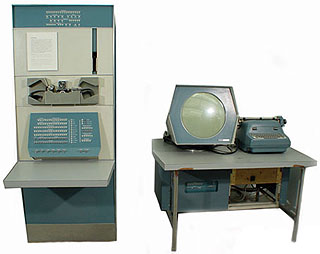
Log in! (photo from the Computer History Museum)
In usability testing with consumers (i.e., non-computer experts), I have noticed that a huge number of people use the expression “log on” to simply mean “go to a web site”. They’ll say that they’ve “logged into Google”, suggesting that they’ve entered a user name and password, when they really mean “I typed ‘www.google.com’ into the browser and hit enter”. Importantly, I don’t think I’ve ever seen anyone under the age of 45 say this.
I also notice a large number of people in this age group use the expression “punch” to mean “type”. As in “I punched in my email address and password”.
Whenever I hear this, I can’t help but imagine (to my horror) that inside of their heads they are thinking that every time they type a key on a computer keyboard, there is a hole being punched into a paper card in a mainframe somewhere!
It’s an interesting phenomenon that we tend to continue to use the conventions we learned the first time we learned to use a computer, even if those conventions are obsolete. For example, a huge number of people double-click links in web browsers, which I suspect is a kind of legacy from their experience double-clicking icons when they first learned how to use GUI-based computers. They associate major changes of what is visible on the screen (such as launching an app or going to a new web site) with double-clicks.
Comments
4 responses to “Old mental models never die…”
re: double-clicking
i’ve seen lots of people also double-click the OS X Dock icons as well.
It’s painful to watch.
Yes. And I’ve heard “log on to the Internet”.
Other technologies too: how many phones now have dials? Yet many people still “dial” a number.
Other technologies too: how many phones now have dials? Yet many people still “dial” a number.